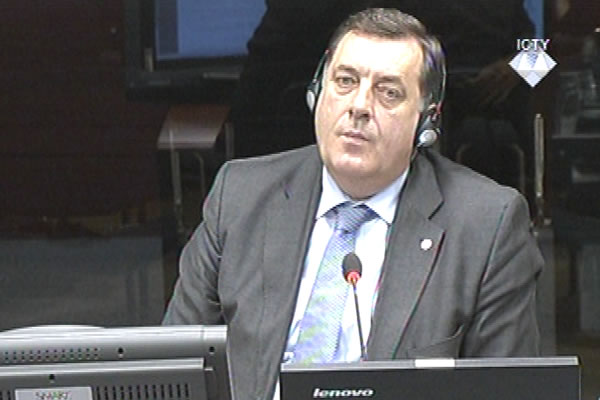Home
FROM ISLAMIC DECLARATION TO ISLAMIC STATE
In his evidence in Ratko Mladic’s defense, Republika Srpska president Milorad Dodik has blamed the Muslim leadership for the outbreak of the war in BH. According to Dodik, Alija Izetbegovic’s policy and the statements he made in his Islamic Declaration were ‘precursors to the current ideology of radical Islam’. The prosecutor contested Dodik’s claims by quoting from an interview Karadzic gave in 1990, when he said ‘there is no need to panic’ in BH because local Muslims had all opted for ‘the European way of life while following their Islamic faith’
 Milorad Dodik, defence witness at Rako Mladic trial
Milorad Dodik, defence witness at Rako Mladic trial Current Republika Srpska president Milorad Dodik began today his fourth and final testimony before the Tribunal as Ratko Mladic’s defense witness. Dodik already appeared three times – first at the sentencing hearing of Biljana Plavsic in 2002, then at the request of the prosecution in Radislav Brdjanin’s case in 2003, and finally in 2013 when he gave evidence in Radovan Karadzic’s defense. Today Dodik described the events and presented his impression about the time when he was first a member of the BH Parliament representing the Union of Reformist Forces, and then an independent member of the Bosnian Serb Assembly.
In Dodik’s opinion, the war in BH began because of the Muslims’ efforts to ‘use their majority to outvote’ the other nations and declare an independent state. Croats helped Muslims to do that, Dodik agreed. But, Dodik argued, nowadays Croats tell him that they were wrong and that they would never make the same mistake. According to Dodik, the Muslims tried to dominate the state, they refused to heed anyone else in the Parliament, they abused public functions, set up the Patriotic League and basically they were to blame for all the negative developments in the public sphere before the conflict. Dodik also blamed the Muslims for the event that started the war, the killing of a Serb wedding guest in Sarajevo on 1 March 1992. While he was at it, Dodik also blamed the Patriotic League for the crime against Serb civilians in Sijekovac in late March 1992, although it has been stated many times in the Tribunal’s courtrooms that the Croat armed forces had perpetrated that crime.
Mladic’s defense lawyers and other defense witnesses have already suggested – particularly after the terrorist attack in Paris – that the Bosnian Muslim political movement in the 1990s was ‘close’ to the radical Islamist groups of today. Dodik, however, was the first to openly highlight the purported relation between the two. According to Dodik, Alija Izetbegovic was a ‘precursor to the current ideology of radical Islam’. The key proof is the fact that in 1970 the former BH president had written the Islamic Declaration, a document in which he proclaimed that the state should be based on the sharia law.
If Islamic declaration was really such a thorn in the Bosnian Serbs’ side, it would mean that it had to have been hotly debated in the Bosnian Serb Assembly sessions, the prosecutor noted. The former member of the parliament agreed with the prosecutor, adding that the Islamic declaration was indeed often mentioned. The members would regularly refer to it, saying ‘as stated in Alija Izetbegovic’s Islamic declaration…’, Dodik explained. The prosecution team had gone through the transcripts of all the assembly sessions and prosecutor Tieger presented the fruit of their labor. The Islamic declaration was mentioned for the first time at 35th Assembly session held on 2 October 1993. Dodik corrected his previous claim saying that the declaration had been discussed outside of the Assembly hall. In the sessions, the members used the term ‘Alija’s policy’, Dodik added.
The prosecutor continued the cross-examination by putting it to the witness that Radovan Karadzic was less hostile to the Bosniaks before the war than Dodik was now. In an interview from 1990 Karadzic said that Islamic fundamentalism came from the people of another race who spoke a different language, not from local Muslims, ‘Slavic people of our blood who have opted for the European quality of life while following their Islamic faith’, Karadzic said in the interview. The prosecutor asked Dodik if that was yet another indicator of a ‘well known fact’ that Bosnian Muslims were ‘a Europeanized nation’. ‘Do you mean to say that the Serbs aren’t’, Dodik replied with a question. Although the prosecutor usually forbears from responding to the witnesses’ comments on his work, this time he 'strenuously reject[ed]’ Dodik’s suggestion. Dodik finally admitted that the Bosniaks were ‘the most secular Muslims in Europe’ but in the 1990s they supported Alija Izetbegovic’s extremist views.
Contrary to Dodik’s suggestion that the steps taken by the BH Serb leadership were a response merely to the Muslim radicalism, the prosecutor stressed that the Serbs had in fact had a pre-agreed plan to implement their strategic goals. The goals, the prosecutor recalled, implied their territorial separation from the other two ethnicities. Also, the prosecutor showed minutes from a SFRY Presidency meeting in December 1991, when Radovan Karadzic addressed the rump body. Karadzic said that his leadership ‘planned which steps ’ to take ‘as soon as Alija screws up’.
At the Republika Srpska Assembly session in Bijeljina in January 1993 it was decided that the ‘Muslims are not a nation’. Dodik couldn't remember if he had attended the session. If he had, he voted ‘yes’ because the decision had been passed unanimously. Dodik will continue his evidence tomorrow.
Linked Reports
- Case : Mladic
- 2015-12-03 CONTESTING REPORTS ON SREBRENICA EXHUMATIONS
- 2015-12-01 DIFFICULTIES UNDERSTANDING CRIMINAL PROCEEDINGS
- 2015-12-01 HOW WITNESSES IN VOJISLAV SESELJ’S CASE WERE MADE TO ‘CHANGE THEIR MINDS’
- 2015-12-08 DODIK: SDS PARTY LEADERSHIP INVOLVED IN WAR CRIMES
- 2015-12-09 LISBON AGREEMENT – CHANCE FOR PEACE OR PLAN TO DESTROY BOSNIA?
- 2015-12-10 SNIPERS ‘WERE ONLY KIDDING’
